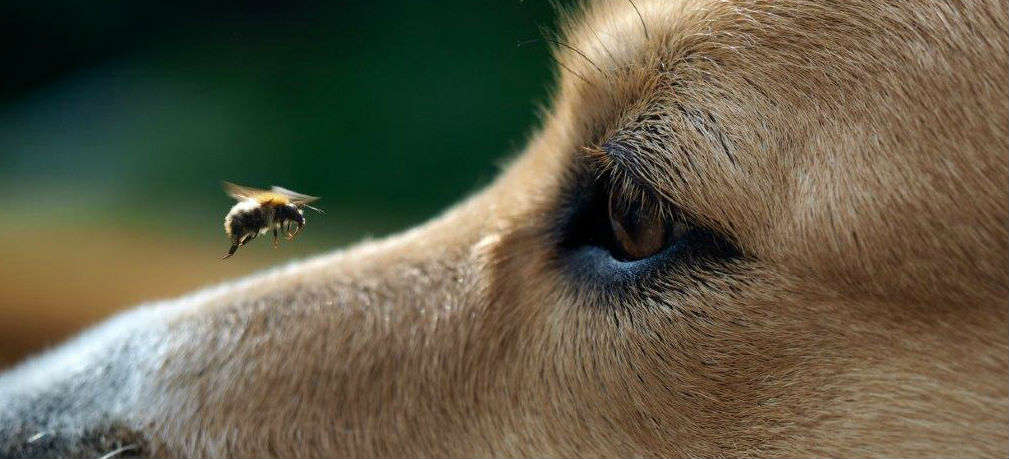My dog got stung by a wasp or bee and had an allergic reaction. What should my next steps be?
Original Question: Good morning, my 40 pound dog was stung by a bee or wasp. Within 2 minutes she had diarrhea and could barely walk. I had to carry her over 1 km to my car and I gave her Benadryl at home approximately 1 hour after the sting. She did not have difficulty breathing but was lethargic and swollen for the rest of the day. My question is should she have an allergy test done and should I have an epipen? I do carry Benadryl. Thanks - Nancy
 Mar 1, 2018
Mar 1, 2018
TRANSCRIPT:
I’m Dr. Clayton Greenway with healthcareforpets.com and we’re answering questions this morning. We’ve got one here from Nancy it says, “Good morning. My 40lb dog was stung by a bee or wasp. Within two minutes she had diarrhea and could barely walk. I had to carry her over a kilometer to my car and gave her Benadryl at home approximately an hour after the sting. She did not have difficulty breathing but was lethargic and swollen for the rest of the day. My question is, should she have an allergy test done and should I have an EpiPen? I do carry Benadryl with me.”
This is a really interesting question because 13 years of being a veterinarian, I’ve never seen a reaction quite this bad to a bee sting. I’ve seen all sorts of cats and dogs getting insect bites, spider bites, bee bites things like that. The typical reaction is that they will get swelling. They often get swelling in their face and they get very puffy around their muzzle, they start scratching at themselves. I have not seen an episode where all of a sudden the dog can’t walk and has an immediate bout of diarrhea. There might have been a lot of stress in this case related to the bug bite and some of our dogs can be quite sensitive and overreact to things like that because let’s face it, they don’t know what happened to them. They just felt this incredible pain and there could have been a lot of anxiety and nervousness that happened in this case because it’s unusual to have an allergic reaction that basically makes it so the dog can’t walk but it does sound fairly serious.
I have to assume that this is probably an allergic reaction from the series of events that took place, but I’d want Nancy to go to her veterinarian and basically do some blood work, make sure that there’s a physical exam, make sure that nothing else is going on with the dog. You never know if they’re having another medical condition that just made this reaction worse than we typically see. So barring that, we can kind of start to safely assume that it’s an allergic reaction. Sometimes allergic reactions build, so they’re not so immediate. I can understand why she’s asking about an EpiPen and at this point we don’t have that type of device for dogs or cats. The fact that her dog didn’t have any breathing difficulties or didn’t have any problems with that, I’d probably refrain from using something immediate like an EpiPen. I think administering an antihistamine is a very good idea, you could ask your veterinarian in cases of serious allergic reactions for like a steroid medication which you really don’t want to have to use, it’s a much more serious medication, it has a lot of side effects and you’re going to want to talk to your veterinarian about that, but it’s certainly stronger and can control an allergic reaction a lot quicker. Giving someone a syringe and needle with medication in it, there’s a liability to that and although we do that with certain drugs, certainly an EpiPen or a cortisol shot or steroid shot, these are much more serious drugs and they can be dangerous so I would say that not every veterinarian is going to be comfortable with giving that out but you could certainly discuss that with your veterinarian. The absorption rate for a steroid pill is quite rapid, so I think that’s quite useful.
You can on days where you’re going to places that you think a bee sting could happen, you could always give Benadryl before you go, but of course we don’t want to be using medication all the time on the risk of getting a sting but certainly antihistamines work a lot better if they’re already in the system.
Allergy tests, this is done on dogs that have typical allergies and seasonal allergies. Most panels of allergy testing won’t have bees or wasps on them. I don’t believe there’s a test specifically for that but I think just the series of events would suggest that Nancy’s dog does have an allergy to bee stings and just like people, you’re going to want to seek help or attention right away. It doesn’t sound like it would be fatal by any means, but it just means that the dog will get very uncomfortable, very rapidly and you’re going to want to start treating right away so talk to your veterinarian about possibilities of that, that they can dispense to you. Probably more oral drugs that absorb rapidly would be ideal in this situation. I really appreciate the question, good luck with things and thanks for coming to healthcareforpets.com. Remember we’re dedicated to your pet’s health and keep those questions coming.


Disclaimer: healthcareforpets.com and its team of veterinarians and clinicians do not endorse any products, services, or recommended advice. All advice presented by our veterinarians, clinicians, tools, resources, etc is not meant to replace a regular physical exam and consultation with your primary veterinarian or other clinicians. We always encourage you to seek medical advice from your regular veterinarian.

